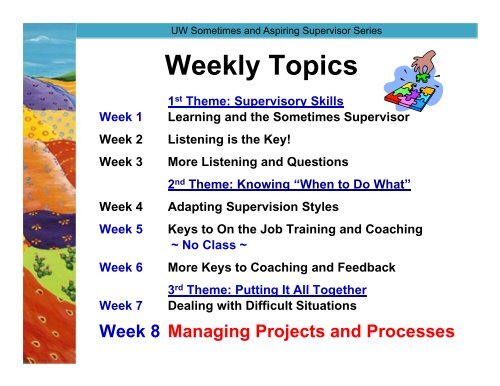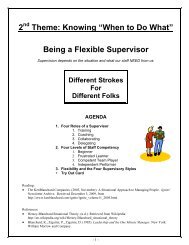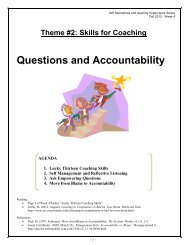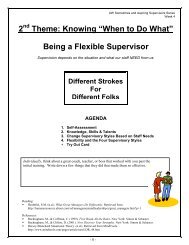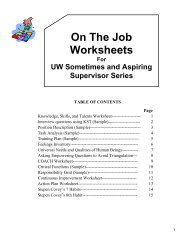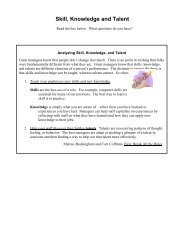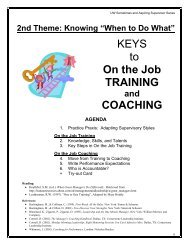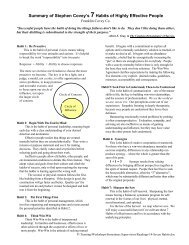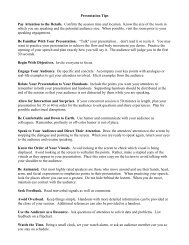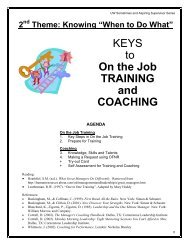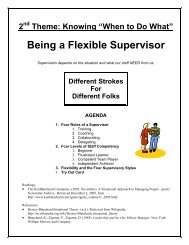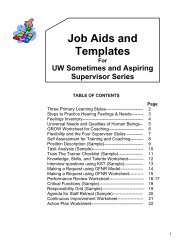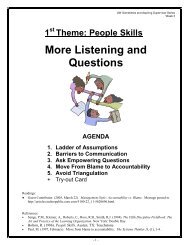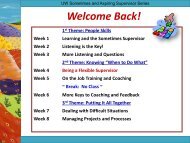Weekly Topics
Weekly Topics
Weekly Topics
Create successful ePaper yourself
Turn your PDF publications into a flip-book with our unique Google optimized e-Paper software.
UW Sometimes and Aspiring Supervisor Series<br />
<strong>Weekly</strong> <strong>Topics</strong><br />
Week 1<br />
Week 2<br />
Week 3<br />
Week 4<br />
Week 5<br />
Week 6<br />
Week 7<br />
1 st Theme: Supervisory Skills<br />
Learning and the Sometimes Supervisor<br />
Listening is the Key!<br />
More Listening and Questions<br />
2 nd Theme: Knowing “When to Do What”<br />
Adapting Supervision Styles<br />
Keys to On the Job Training and Coaching<br />
~ No Class ~<br />
More Keys to Coaching and Feedback<br />
3 rd Theme: Putting It All Together<br />
Dealing with Difficult Situations<br />
Week 8 Managing Projects and Processes
UW Sometimes and Aspiring Supervisor Series<br />
Welcome to the Final<br />
UW SOMETIMES AND ASPIRING SUPERVISOR SERIES<br />
3 RD THEME: PUTTING IT ALL TOGETHER<br />
8. Managing<br />
Projects<br />
and<br />
Processes
UW Sometimes and Aspiring Supervisor Series<br />
8. Managing Projects and Processes<br />
AGENDA<br />
1. Covey’s 7 Habits of Highly<br />
Effective People<br />
2. Putting First Things First<br />
3. Urgent vs. Important<br />
4. Tools for Managing Projects<br />
5. Tools for Managing Process<br />
6. Planning a Staff Retreat at UW<br />
7. Letter to Myself<br />
8. Graduation!!
UW Sometimes and Aspiring Supervisor Series<br />
1. STEPHEN COVEY’S 7 HABITS OF<br />
HIGHLY EFFECTIVE PEOPLE +<br />
the NEW 8 th Habit<br />
First, let’s review the 8 th Habit:<br />
“Find Your Voice and Help Other Find Theirs”<br />
At your table, identify principles<br />
or practices from SASS that relate<br />
to the 7 Habits. Write them in<br />
table in packet.<br />
• What questions do you have?<br />
• We’ll share your examples
UW Sometimes and Aspiring Supervisor Series<br />
2. Put First Things First<br />
Individually,<br />
take a moment to consider<br />
your answers to the<br />
questions from Chapter 2 of<br />
First Things First.<br />
• Complete the Urgency<br />
Index on next page<br />
We’ll share your thoughts after<br />
the next task.
UW Sometimes and Aspiring Supervisor Series<br />
3. URGENT vs. IMPORTANT<br />
Time Management Matrix<br />
I<br />
M<br />
P<br />
O<br />
R<br />
T<br />
A<br />
N<br />
T<br />
Urgent<br />
I<br />
Routine Work<br />
Handling Customers<br />
Crises<br />
Pressing Problems<br />
Deadline-driven projects<br />
Meetings, preparations<br />
Not Urgent<br />
II<br />
Preparation<br />
Prevention<br />
Strategic Planning<br />
Goal Setting<br />
Coaching<br />
Building relationships<br />
Empowering
UW Sometimes and Aspiring Supervisor Series<br />
3. URGENT vs. IMPORTANT<br />
Time Management Matrix<br />
N<br />
O<br />
T<br />
I<br />
M<br />
P<br />
O<br />
R<br />
T<br />
A<br />
N<br />
T<br />
Urgent<br />
III<br />
Some:<br />
Interruptions<br />
Phone calls<br />
Emails<br />
Reports<br />
Meetings<br />
Many pressing matters<br />
Not Urgent<br />
IV<br />
Trivia<br />
Busywork<br />
Time wasters<br />
Irrelevant mail, email<br />
Excessive TV
UW Sometimes and Aspiring Supervisor Series<br />
3. URGENT vs. IMPORTANT<br />
I<br />
Urgent &<br />
Important<br />
II<br />
Not Urgent &<br />
Important<br />
III<br />
Urgent &<br />
Not Important<br />
IV<br />
Not Urgent &<br />
Not Important
UW Sometimes and Aspiring Supervisor Series<br />
3. URGENT vs. IMPORTANT<br />
Individually, write the activities you spend<br />
time doing.<br />
In pairs, share your thoughts to the last two<br />
exercises.<br />
• What do you want to spend more time doing?<br />
• What activities take time from important things<br />
you want to do?<br />
• What changes would you like to make?<br />
"The secret of getting ahead is getting started. The secret of getting started is<br />
breaking your complex overwhelming tasks into small manageable tasks, and then<br />
starting on the first one." Mark Twain
UW Sometimes and Aspiring Supervisor Series<br />
4. Tools for Managing Projects<br />
Read the box. What questions do you have?<br />
Project Management organizes and manages<br />
resources and work required to complete a project<br />
within defined scope, time, and cost constraints. A<br />
project is a temporary, one-time endeavor.<br />
Process Management: organizes, manages or<br />
improves permanent or semi-permanent ongoing<br />
functional work that creates the same product or<br />
service over-and-over again.<br />
The management of these two systems is<br />
often very different and requires different tools.
UW Sometimes and Aspiring Supervisor Series<br />
4. Tools for Managing Projects<br />
Sample Tools for<br />
Project Management<br />
Microsoft Project Software
UW Sometimes and Aspiring Supervisor Series<br />
4. Tools for Managing Projects<br />
Sample Tools for<br />
Project Management<br />
5 PM
UW Sometimes and Aspiring Supervisor Series<br />
4. Tools for Managing Projects continued<br />
Examples of hard copy or<br />
computer based Grids to<br />
Manage Projects<br />
Training Resource Center Office Log<br />
Name<br />
Office Routine (live link)<br />
Date From To Message Resolution<br />
4/7 Mary All<br />
staff<br />
Read email from WU PC help re: Trojan<br />
infecting computers.<br />
Read:<br />
Shannon, Lisa<br />
4/6 Mary Lisa Set up brainstorming time for Union 101<br />
group<br />
4/6 Lisa Kelly Carol Buckingham from Dimensions<br />
called you back.<br />
Still looking for<br />
date<br />
Kelly returned<br />
call 11/7
UW Sometimes and Aspiring Supervisor Series<br />
4. Tools for Managing Projects continued<br />
Example of a<br />
FREE BLOG<br />
Wordpress.com
UW Sometimes and Aspiring Supervisor Series<br />
4. Tools for Managing Projects continued<br />
Using UW WisCal to Manage Projects<br />
What methods<br />
do you use to<br />
manage<br />
projects?
UW Sometimes and Aspiring Supervisor Series<br />
5. Tools for Managing Processes<br />
AKA Departmental Planning<br />
Department<br />
Purpose/ Mission<br />
Customers<br />
Department Expectations<br />
Major Responsibilities<br />
Critical Functions<br />
Task Analyses or Mapping/Flowcharting<br />
Ongoing Improvement Analyses
UW Sometimes and Aspiring Supervisor Series<br />
5. Tools for Managing Processes continued<br />
AKA Departmental Planning<br />
Department<br />
Purpose/ Mission<br />
Customers<br />
Expectations<br />
WU Staff Education and Training<br />
New Facilitator Information & Unit<br />
Expectations<br />
Contents:<br />
1. Hiring Requirements<br />
2. Facilitator Responsibilities
UW Sometimes and Aspiring Supervisor Series<br />
5. Tools for Managing Processes continued<br />
Major Responsibilities<br />
Summarizes on 1 page who is<br />
responsible for major functions<br />
• Can be a summary of PD’s<br />
• Use to orient new staff &<br />
• Communicate to others<br />
• Helpful in times of transitions
UW Sometimes and Aspiring Supervisor Series<br />
5. Tools for Managing Processes continued<br />
Major Responsibilities<br />
Staff Ed & Training Responsibilities Summer 09<br />
Director Assistant Director Special Projects<br />
A. A. A.<br />
B. B. B.<br />
C. C. C.<br />
Your<br />
Turn<br />
Individually, draft a Responsibility Grid<br />
for yourself and someone else in your<br />
department.
UW Sometimes and Aspiring Supervisor Series<br />
5. Tools for Managing Processes continued<br />
Critical Functions<br />
Identify tasks that must be<br />
performed<br />
• Daily,<br />
• <strong>Weekly</strong><br />
• Monthly<br />
Even if primary person<br />
responsible for task is absent.<br />
Also identifies the back-up<br />
person who has been trained.
UW Sometimes and Aspiring Supervisor Series<br />
5. Tools for Managing Processes continued<br />
Critical Functions<br />
Task Timing Primary Back-up<br />
TRC Office Management<br />
Respond to email to TRC Daily Elizabeth Office St<br />
Respond to TRC log Daily Office St Bradley<br />
Pick up & sort mail 1:30 daily HR Bradley<br />
New Staff Workshop Support<br />
Confirm TITU Daily AM Elizabeth Bradley<br />
Email reminders 3 days prior Elizabeth Anna<br />
Your<br />
Turn<br />
Individually, identify some Critical<br />
Functions in your department.
UW Sometimes and Aspiring Supervisor Series<br />
6. Planning a staff retreat at UW:<br />
Review Sample Retreat Agenda<br />
A typical summer retreat could include:<br />
• Create list of accomplishments<br />
from previous year<br />
• Review/create goals for this year<br />
• Update Critical Functions list<br />
• Analyze “What’s working, what<br />
could be better?”<br />
• Start a project/action list<br />
Things to consider in packet
UW Sometimes and Aspiring Supervisor Series<br />
7. A letter to myself<br />
Let’s project ourselves into the future as the person<br />
that we are destined to be!<br />
• Write a short letter to yourself dated 3 months from<br />
today. Name 1-3 things you’ve done differently as a<br />
result of this series.<br />
• Place yourself in the<br />
future. Be specific.<br />
Write in the past tense,<br />
as if these accomplishments<br />
were already in the past.
UW Sometimes and Aspiring Supervisor Series<br />
8. Congratulations!<br />
on Completing the<br />
UW Sometimes and Aspiring<br />
Supervisor Series!<br />
“Never doubt that a small<br />
group of concerned citizens<br />
can change the world.<br />
Indeed, it is the only thing<br />
that ever has.”<br />
Margaret Mead


